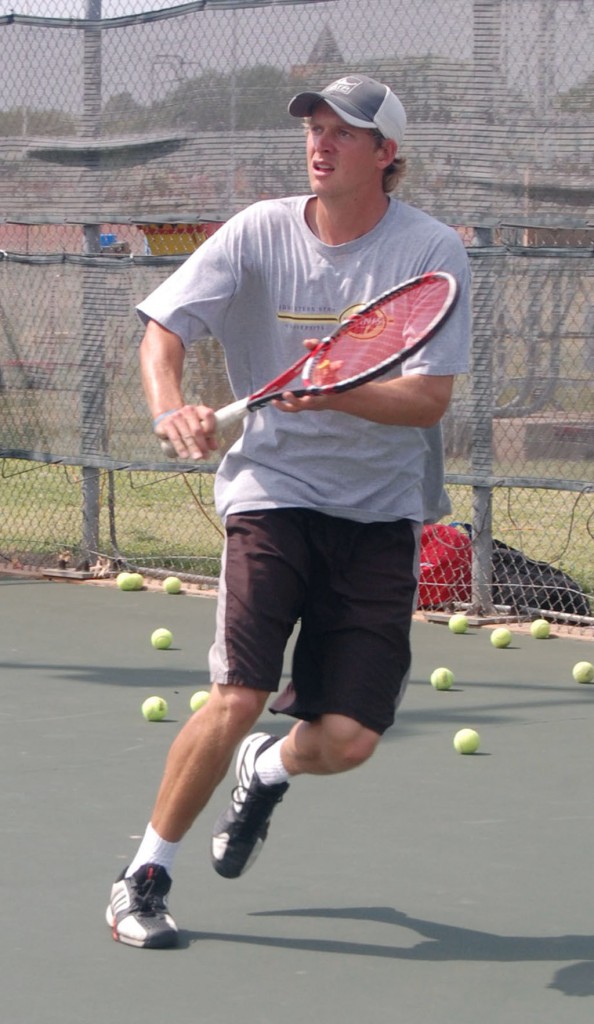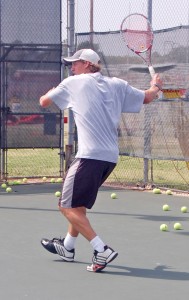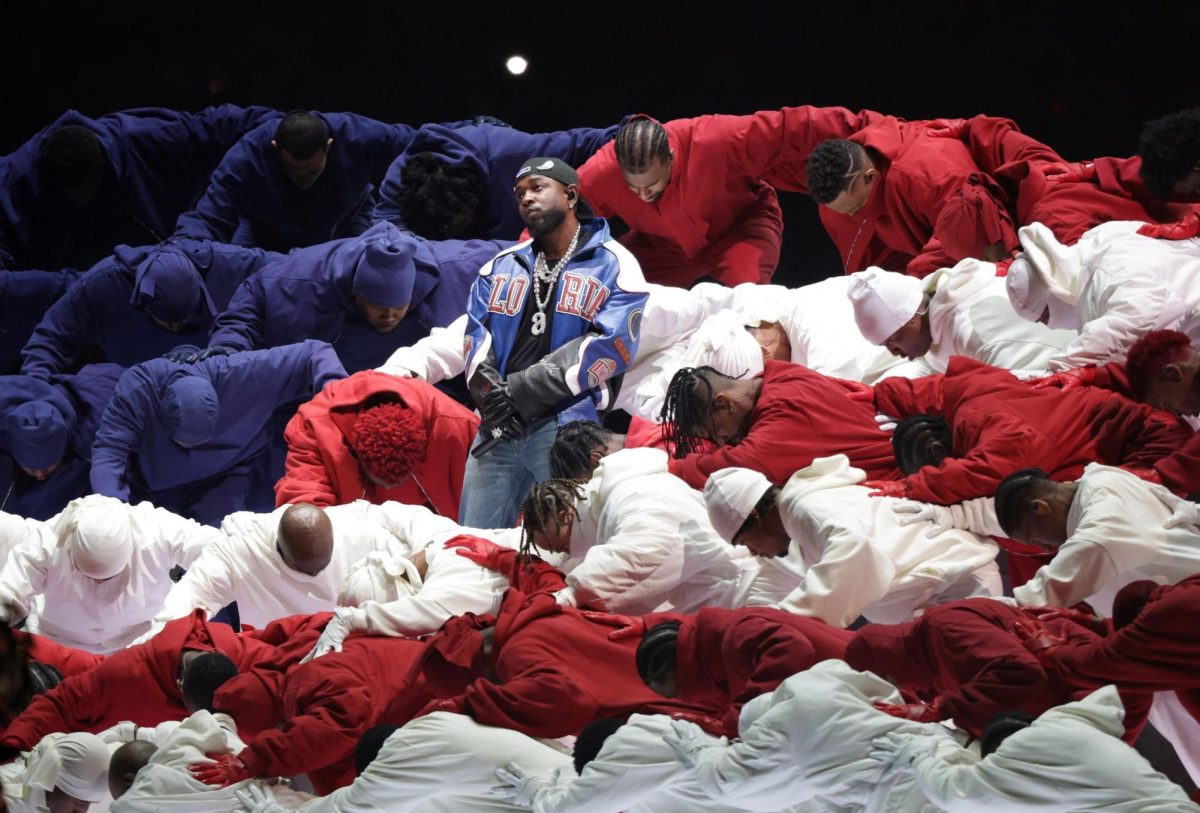Daniel Hangstefer has spent the better part of his life eating, sleeping and breathing tennis
 The graduate assistant tennis coach for both the men and women’s tennis teams has conquered many feats throughout his life, but one in particular has always been in the forefront—Hangstefer is legally deaf.
The graduate assistant tennis coach for both the men and women’s tennis teams has conquered many feats throughout his life, but one in particular has always been in the forefront—Hangstefer is legally deaf.
According to Hangstefer, while he must use close captioning while watching television and sometimes has trouble hearing the radio, he has never considered his hearing impairment as an obstacle to his success.
“I am blessed to have been raised in a family and environment that strongly encouraged and pushed for excellence.”
Hangstefer and his little sister will both continue that legacy of excellence when they will travel to Bulgaria this summer to represent the U.S. in the Deaflympics.
The Deaflympics, held every four years, consists of elite athletes from all over the world and include many of the same sports of the regular Olympics, including badminton, soccer, taekwondo and tennis.
More than 4,000 deaf athletes and officials from 77 nations participated in the 21st Summer Deaflympics in Taipei, Chinese Taipei, in September 2009.
Today, 104 national deaf sports federations are members of International Committee of Sports for the Deaf.
The International Olympic Committee (IOC) at its 50th session in Paris in June 1955 resolved to admit the organization as an International Federation with Olympic standing.
Since 1985, the flag of International Olympic Committee has flown next to those of the ICSD at the Summer and Winter Deaflympics.
In order to participate in the Deaflympics, an athlete must be defined as a hearing loss of at least 55 dB per tone average in the better ear and a member of an affiliated National Deaf Sports Federation and citizens of that country.
Athletes are not allowed to wear hearing aids or hearing devices during the competition.
“Many of the athletes participating are every bit as talented and qualified as their fellow hearing athletes,” he said.
Hangstefer said he is more than excited to be competing with his youngest sister Emily at the competition, but there is one final obstacle standing in his way.
“The U.S. Olympic committee only financially supports the Olympic and Paralympic athletes,” he said. “The U.S. is one of the few countries that does not financially support deaf athletes. Many other countries do, which automatically puts the U.S. at a disadvantage when it comes to Deaflympics.”
Hangstefer is actively fundraising for his upcoming trip, which will require him to gather $4,500.
“I need to raise $4,500 to cover all expenses, including travel, lodging, uniforms, fees and other expenses,” he said.
The funding is Hangstefers greatest obstacle keeping him from making the trip, he said, and needs the community’s support in helping him make this once-in-a lifetime opportunity a reality.
The easiest way to make donations, he said, is through his Razoo fundraising website at www. Razoo.com/story/Daniel-Hangstefer. The community and student body may also visit his blog at deaflympics2013.blogspot.com.
A FAMILY AFFAIR
 Hangstefer and his five siblings all grew up playing tennis, he said. All six of the Hangstefers played collegiate tennis, five of them playing at the Division I level.
Hangstefer and his five siblings all grew up playing tennis, he said. All six of the Hangstefers played collegiate tennis, five of them playing at the Division I level.
Four of his siblings played at UT Chattanooga, and his oldest brother played at Chattanooga State Community College. His oldest sister was also the head women’s tennis coach before she got married, he said.
Hangstefer’s youngest sister, Emily, was also born with a hearing impairment, and will be attending the Deaflympics in Bulgaria as well.
Some of Hangstefer’s heroes include his father who was given only six months to live back in his twenties.
“Shortly after he married my mom, he was diagnosed with brain cancer,” he said. “By the grace of God he is still alive today, cancer free (35 years later).”
Hangstefer’s father now works as a nutritional consultant and helps thousands of other people around the U.S. to get well.
PREPARING FOR THE DEAFLYMPICS
Johnny Simmons, of Hamilton Tennis Park in Wichita Falls, informed Hangstefer of the Deaflympics. Simmons coached the Deaflympics in the early 80s.
Because Hangstefer grew up outside the deaf community, he had never heard of the Deaflympics until Simmons told him about it.
With the support of both Simmons and MSU Head Tennis Coach Scott Linn, Hangstefer is now making the jump to attend the competition.
According to Hangstefer, the Deaflympics almost didn’t happen this year.
“It was originally planned to be in Greece, but as we all know the economy in Greece kind of fell apart,” he said. “At the last minute, Bulgaria signed with the ICSD to take over and play host to the Deaflympics.”
The last-minute change allowed little time for athletes to prepare for the games, especially the U.S. athletes who must raise their own money in order to compete.
“I personally need to raise $4,500 to cover all expenses by June 1,” he said.
Hangstefer said he trains five days per week, including strength training. Staying physically fit is imperative to his success, he said.
The men’s competition in Deaflympics is formatted like professional men’s tennis, he said, meaning you play three out of five sets.
“Additionally, the Deaflympics will be held on red clay courts,” he said, “which means the ball bounces slower and points last longer. It will be very physically demanding.”
HANGSTEFER AND MSU TENNIS
As the graduate assistant tennis coach at MSU, Hangstefer said he devotes most of his time to working with both the players on the team and Coach Scott Linn develop a championship program
“Our vision is to develop the best small college tennis program in the country,” he said. “This includes everything from winning on the court, to a high team GPA, to working in the community (the team has logged in over 200 community service hours this year), and to develop a great alumni relationship.








